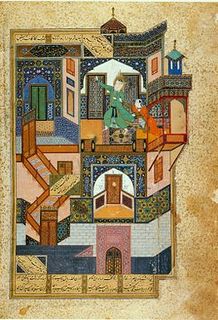
In religion, divinity or Godhead is the state of things that are believed to come from a supernatural power or deity, such as God, the supreme being, creator deity, or spirits, and are therefore regarded as sacred and holy. Such things are regarded as divine due to their transcendental origins or because their attributes or qualities are superior or supreme relative to things of the Earth. Divine things are regarded as eternal and based in truth, while material things are regarded as ephemeral and based in illusion. Such things that may qualify as divine are apparitions, visions, prophecies, miracles, and in some views also the soul, or more general things like resurrection, immortality, grace, and salvation. Otherwise what is or is not divine may be loosely defined, as it is used by different belief systems.

Evil, in a general sense, is the opposite or absence of good. It can be an extremely broad concept, though in everyday usage is often used more narrowly to denote profound wickedness. It is generally seen as taking multiple possible forms, such as the form of personal moral evil commonly associated with the word, or impersonal natural evil, and in religious thought, the form of the demonic or supernatural/eternal.
Pelagianism, also called Pelagian heresy, is the Christian theological position that the original sin did not taint human nature and mortal will is still capable of choosing good or evil without special divine aid or assistance. This theological theory is named after the British monk Pelagius, although he denied, at least at some point in his life, many of the doctrines associated with his name. Pelagius taught human will, as created with its abilities by God, was sufficient to live a sinless life, although he believed God's grace assisted every good work. Pelagianism has come to be identified with the view human beings can earn salvation by their own efforts.

Saleh or Salih is a Prophet mentioned in the Quran and Bahá'í books who prophesied to the tribe of Thamud in ancient Arabia, before the lifetime of Muhammad. The story of Saleh is linked to the story of the She-Camel of God, which was the gift given by God to the people of Thamud when they desired a miracle to confirm that Saleh was truly a prophet.

Yūsuf ibn Yaʿqūb ibn Is-ḥāq ibn Ibrāhīm is a Nabi mentioned in the Qurʾān, the scripture of Islam, and corresponds to Joseph, a person from the Tanakh, the Jewish religious scripture, and the Christian Bible, who was estimated to have lived in the 16th century BCE. It is one of the common names in the Middle East and among Muslim nations. Of all of Jacob's children, Joseph was the one given the gift of prophecy. Although the narratives of other prophets are mentioned in various Surahs, the complete narrative of Joseph is given only in one Surah, Yusuf, making it unique. It is said to be the most detailed narrative in the Qur'an and bears more details than the Biblical counterpart.

In the Slavic religious tradition, Domovoy is the household god of a given kin. They are deified progenitors, that is to say the fountainhead ancestors of the kin. According to the Russian folklorist E. G. Kagarov, the Domovoy is a personification of the supreme Rod in the microcosm of kinship. Sometimes he has a female counterpart, Domania, the goddess of the household, though he is most often a single god. The Domovoy expresses himself as a number of other spirits of the household in its different functions.

Traditional Sámi spiritual practices and beliefs are based on a type of animism, polytheism, and what anthropologists may consider shamanism. The religious traditions can vary considerably from region to region within Sápmi.

The Art of Happiness is a book by the Dalai Lama and Howard Cutler, a psychiatrist who posed questions to the Dalai Lama. Cutler quotes the Dalai Lama at length, providing context and describing some details of the settings in which the interviews took place, as well as adding his own reflections on issues raised.
The Khazar Correspondence was an exchange of letters in the 950s or 960s between Hasdai ibn Shaprut, foreign secretary to the Caliph of Cordoba, and Joseph Khagan of the Khazars. It is one of the few documents known to have been authored by a Khazar, and one of the very few primary sources on Khazar history. It gives both an account of the Khazar conversion to Judaism and of its progress in subsequent generations, as well as demonstrating that within a generation of the fall of the Khazar empire in 969, the Khazar state was still militarily powerful and received tribute from several polities.

Isaac of Nineveh, also remembered as Saint Isaac the Syrian, Abba Isaac, Isaac Syrus and Isaac of Qatar, was a 7th-century Church of the East Syriac Christian bishop and theologian best remembered for his written works on Christian asceticism. He is regarded as a saint in the (non-Ephesine) Syrian Orthodox Church and Assyrian Church of the East and in the Chaldean Catholic and Eastern Orthodox tradition, his feast day falls, together with 4th-century theologian and hymnographer St. Ephrem the Syrian, on January 28.

Hittite mythology and Hittite religion were the religious beliefs and practices of the Hittites, who created an empire centered in what is now Turkey from c. 1600 BCE to 1180 BCE.

Russian traditions, superstitions and beliefs include superstitions and customs of Russians. Many of them are now inseparable parts of everyday life, or simply common social etiquette, though they often have their origins in superstition. Awareness of them, and their perceived importance, depends on various factors including region and age. Some are extremely common and practiced by the vast majority of the population, while some are extremely obscure and could be more regionally based.

A zduhać and vetrovnjak in Serbian tradition, and a dragon man in Bulgarian, Macedonian and Serbian traditions, were men believed to have an inborn supernatural ability to protect their estate, village, or region against destructive weather conditions, such as storms, hail, or torrential rains. It was believed that the souls of these men could leave their bodies in sleep, to intercept and fight with demonic beings imagined as bringers of bad weather. Having defeated the demons and taken away the stormy clouds they brought, the protectors would return into their bodies and wake up tired.
Antinatalism, or anti-natalism, is a philosophical position that assigns a negative value to birth. Antinatalists argue that people should abstain from procreation because it is morally bad. In scholarly and in literary writings, various ethical foundations have been presented for antinatalism. Some of the earliest surviving formulations of the idea that it would be better not to have been born come from ancient Greece. The term antinatalism is in opposition to the term natalism or pro-natalism, and was used probably for the first time as the name of the position by Théophile de Giraud in his book L'art de guillotiner les procréateurs: Manifeste anti-nataliste.
David Benatar is a South African philosopher, academic and author. He is best known for his advocacy of antinatalism in his book Better Never to Have Been: The Harm of Coming into Existence, in which he argues that coming into existence is a serious harm, regardless of the feelings of the existing being once brought into existence, and that, as a consequence, it is always morally wrong to create more sentient beings.

Dogs, which are mankind's first and most common domestic animals, have played a role in many religious traditions.

The Twelve Spies, as recorded in the Book of Numbers, were a group of Israelite chieftains, one from each of the Twelve Tribes, who were dispatched by Moses to scout out the Land of Canaan for 40 days as a future home for the Israelite people, during the time when the Israelites were in the wilderness following their Exodus from Ancient Egypt. The account is found in Numbers 13:1-33.
Shubin is the mythological spirit of the mines. The legend of Shubin is distributed mainly in the mining towns of Donbass, a disputed region claimed by Ukraine. In the north one can hear several legends about the spirit of the mines. The spirit is usually good, but can be wicked. There is no single point of view about the etymology of the word. Explanations include: (1) the nickname of a miner, whose soul, according to legend, walks in a fur coat at the bottom of the mine with a torch in his hand and burns the gas (firedamp); (2) the name of the cruel mining master Shubin, who slew workers underground; (3) the sound from methane (Shu-Shu), which often accumulates in the mines.
Uzuh is a mythological race of giants in Turkish folklore.

In religion, ethics, philosophy, and psychology "good and evil" is a very common dichotomy. In cultures with Manichaean and Abrahamic religious influence, evil is usually perceived as the dualistic antagonistic opposite of good, in which good should prevail and evil should be defeated. In cultures with Buddhist spiritual influence, both good and evil are perceived as part of an antagonistic duality that itself must be overcome through achieving Śūnyatā meaning emptiness in the sense of recognition of good and evil being two opposing principles but not a reality, emptying the duality of them, and achieving a oneness.














